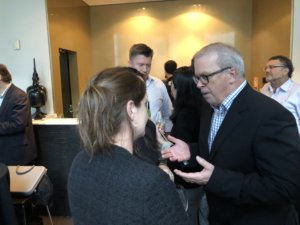The development of the open source platform – An industry perspective
What if people create their own trading programs? They need ‘appropriate’ leverage, a good product range, price spread, charting capabilities, technical analysis tools, fundamental analysis, and the ability to trade from the chart, and probably many other functionalities says Richard Goers

There has been much dialog, but not much action with regard to the evolution of retail trading platforms in recent years.
For many brokerages, relying on the status quo which represents an unholy alliance between third party vendor MetaQuotes, thereby disabling a broker from owning its own client base or infrastructure and becoming subservient to an affiliate marketing platform rather than empowered by a multi-faceted trading platform, remains.
FinanceFeeds has attended numerous meetings with brokerage senior executives across the globe, all of whom understand the value and importance of going down the multi-asset product expansion route, and almost all of whom understand the clear virtues of having a bespoke user interface which engenders a loyal customer base, enables brokers to own the entire intellectual property base of its business – which let’s face it is why entrepreneurs start businesses in the first place – and offer differentiating services to specific audiences.
A simple glance at the continuity and geographic location of client bases of companies such as Hargreaves Lansdown or CMC Markets, and the absolute lack of reliance on affiliate networks is testimony to that.
This week, Richard Goers, CEO of Australian professional trading platform development company ManagedLeverage spoke out about a continuing issue which is something that has been prominent in the viewpoint of FinanceFeeds for some years, that being the development of open source platforms.
Whether in response to yesterday’s editorial, or a general consensus that this is an increasingly important matter, Mr Goers approached FinanceFeeds by stating “If we look at a particular context, FXCM used to offer on their platform access to a number of specialist platforms, for example algorithmic, backtesting, technical analysis and a signal generator, as well that they offered trading apps which were either for sale or free with degrees of usefulness.”
“It appears that, having glanced at it recently, they have discontinued this offering however this is not the point, the point is they offered platforms that enhanced their basic MT4 offering in some relatively basic form that supported their business model but not trader’s wallet given win:loss ratios” said Mr Goers.
“I see this as a start” he said.
Continuing, Mr Goers said “My observation is that very few FX and CFD margin brokers offer any external platform that enhances the retail client’s trading experience, and in some respects today’s in-house platform development seems to also control that intelligence that is offered.”
“I think that if an external provider had another option, the in house developer would copy them, hence MT4 is safer for external platforms as MT4 is extremely limited in its functionality and also severely limits what brokers can actually provide to their clients” – Richard Goers, CEO, ManagedLeverage
“So let us think about the new new trader” said Mr Goers. “They can create their own trading programs, they need ‘appropriate’ leverage, a good product range, price spread, charting capabilities, technical analysis tools, fundamental analysis, and the ability to trade from the chart, and probably many other functionalities” he said.
“I can think of several facilitation examples that brokers could provide via bespoke platforms, such as back testing, simulation of possible trade scenarios, appropriate leverage in the trade and tools / calculators around this leverage, for example Kelly criteria” said Mr Goers.
“If for example retail customers are traders creating their own trading programs, they don’t need signals [dubious or not] from the broker, just the basic infrastructure to execute, thus this is the speculative trader, the 1 to 2 instrument trader in for the short term” he opined.
“So then we progress to the new trader who trades portfolios, who is perhaps speculative but also takes longer term options. This may be a trader who has a stock portfolio with no leverage and wants to access derivatives to hedge, or get some kick in returns in trading, which I think is the fun stuff” said Mr Goers.
Mr Goers considers that they will need to be able to create and monitor a portfolio of both physical and derivative instruments in their portfolio, therefore a whole new platform experience is required.
“Do you see what I see? he asked. “That being the situation that current platforms, especially the UK and parts of Northern Europe, there are platforms offering thousands of instruments, but the intelligence is still stuck in the basic speculative mindset and revolves around technical analysis, leverage, price spreads, fast execution which is jolly good stuff but not comprehensive enough” he said.
“I think many can be pointy on technical analysis, however many offerings are all the same, so where is the edge? There is none and perhaps that is the point and objective, but if these platforms want to progress, and hedge funds know this stuff including how to build portfolios but these guys make money, most times, so I suggest it is in in-betweeners like high net worth traders who run 8-10 instrument portfolios who need extra smarts which are often not provided” – Richard Goers, CEO, ManagedLeverage
It was therefore a concurrent opinion that many platforms are not dynamic enough for today’s trader.
“A lot of off the shelf developers develop their platforms for the speculative mindset, not the longer term trader, because that is all they know. On the other hand, some in house platforms create stickiness and can scale but cost big bucks to build and maintain and even then many do not support an agency execution model and are clearly built around a market making principle, so they still think their clients are people who will lose money” said Mr Goers.

“Of course, it is all too easy for me to criticise, as they need to make money and their business model reflects this thinking, however I do wonder when the mainstream market will pivot and if they were ready, this low volatility and leverage would not have had such an impact and they may have known ESMA regulations will impact, but not to the degree it has and caught them off guard – see their share prices – because they have the old mindset” he said.
This industry is a highly adaptable business and is largely run and completely operated by entrepreneurs and very dynamic technologists, therefore it is absolutely disruptable, a point Mr Goers agreed on.
“A direction some platforms are taking that I see as enlightened, one example being TradeSocio [although I think social trading has had its day in the sun but may have a comeback] as evolving to the new type of trader” he said.
“I think a big part of the evolution in the platform for tomorrows traders is digital advice [risk profiling, active and passive portfolio selection], machine learning and not simply in the trade signal, but portfolio construction + rebalancing, selection in risk profile, appropriate leverage, Capital Protection models, and of course there has to be a large global instrument universe, along with fundamental analysis” he said.
“Perhaps one method would be if the interface was not a broker platform but maybe a platform of platforms connected to multiple brokers. I think the new trader wants to see progress in how they trade, and not in wallet size as the objective, and to learn continuously and become a better trader which is contrary to the current marketing focus on becoming a millionaire in no time and trading from a beach which is very much an old school mindset” he said.
“With this, the broker platforms as yet have not developed, and as your article pointed out yesterday, even the more advanced old school platforms have yet to evolve into this space. It maybe too early but I see experimenting in platforms offering P2P, combined on chain and off chain trading as a new kid on the block, but still a close cousin to the main players now” he said.
“It is such a radical mindset, these new platforms. They scare the current players who are not in a mode to figure out yet how to offer products for their clients to make money, and then how they make money but there will be a time, so whether they should be open, or not be open, they should allow the trader to progress and the business model that allows this should be in place” he said.
In conclusion, “Is this a mystery or a puzzle?” was the final thought Mr Goers left me with.
Certainly the latter.









